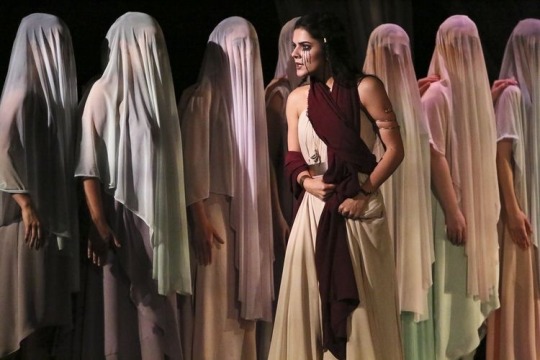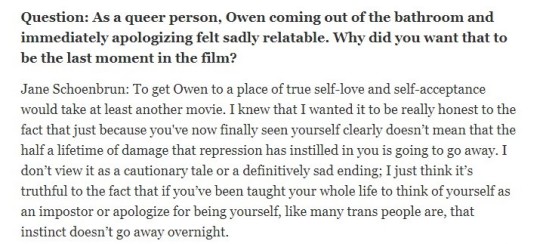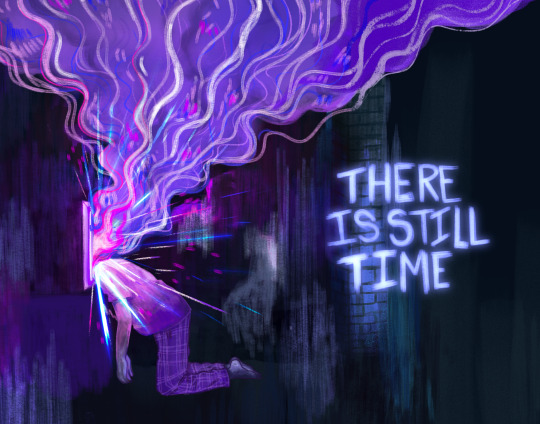Text
“For nothing is fixed, forever and forever and forever, it is not fixed; the earth is always shifting, the light is always changing, the sea does not cease to grind down rock. Generations do not cease to be born, and we are responsible to them because we are the only witnesses they have. The sea rises, the light fails, lovers cling to each other, and children cling to us. The moment we cease to hold each other, the moment we break faith with one another, the sea engulfs us and the light goes out.”
— James Baldwin, from “Nothing Personal,” in Collected Essays
3K notes
·
View notes
Text
One of my favorite parts of life is adopting new personality traits. Last month I decided to become a person who reads in the morning and goes to the library. This month I'm becoming a person who eats oatmeal and loves linen clothes. If you see something in other people that you like, you can just try it on.
9K notes
·
View notes
Text



[OSCAR] chinese grand prix 2025 // media day
1K notes
·
View notes
Photo

Valeria Luiselli, Tell Me How It Ends: An Essay in Forty Questions
[ID: There are things that can only be understood retrospectively, when many years have passed and the story has ended. In the meantime, while the story continues, the only thing to do is tell it over and over again as it develops, bifurcates, knots around itself. And it must be told, because before anything can be understood, it has to be narrated many times, in many different words and from many different angles, by many different minds.]
5K notes
·
View notes
Text









“the ending is always the same”
war of the foxes - richard siken / waterloo - ABBA / euripides’ medea - the little theatre / anne carson / the three fates - luca cambiaso / the oresteia - aeschylus / road to hell II - hadestown / when i met you - mira lightner / andersen’s fairy tale anthology
25K notes
·
View notes
Text
So, your life. There it is before you – possibly a road, a ribbon, a dotted line, a map – let’s say you’re 25, then you make some decisions, do things, have setbacks, have triumphs, become someone, a bus driver, a professor of Indo-European linguistics, a pirate, a cosmetologist, years pass, maybe in a family maybe not, maybe happy maybe not, then one day you wake up and you’re seventy. Looking ahead you see a black doorway. You begin to notice the black doorway is always there, at the edge, whether you look at it or not. Most moments contain it, most moments have a sort of sediment of black doorway at the bottom of the glass. You wonder if other people are seeing it too. You ask them. They say no. You ask why. No one can tell you.
A minute ago you were 25. Then you went ahead getting the life you want. One day you looked back from 25 to now and there it is, the doorway, black, waiting.
— anne carson, gloves on!
6K notes
·
View notes
Text


map panther do you see my vision
8K notes
·
View notes
Text
"lando's offering mark first class travel to every grand prix" 😭😭😭
804 notes
·
View notes
Text
To be aware you might be trans but unwilling to do anything about it is to create endlessly bigger boxes within which to contain yourself. When you are a child, that box might encompass only yourself and your parents. By the time you are a gainfully employed adult, that box will contain multitudes, and the thought of disrupting it will grow ever more unthinkable. So you cease to think of yourself as a person on some level; you think not of what you want but what everybody expects from you. You do your best not to make waves, and you apologize, if only implicitly, for existing. You stop being real and start being a construct, and eventually, you decide the construct is just who you are, and you swaddle yourself up in it, and maybe you die there. There is still time until there isn’t.
This reading of TV Glow’s deliberately anticlimactic, noncathartic ending cuts against the transition narrative you typically see in movies and TV, in which a trans person self-accepts, transitions, and lives a happier life. Owen gets trapped in a space where he knows what he must do to live an authentic life but simply refuses to take those steps because, well, burying yourself alive is a terrifying thing to do. The transition narrative posits a trans existence as, effectively, a binary switch between “man” and “woman” that gets flipped one way or another, but to make our lives so binary is to miss how trans existences possess an inherent liminality.
Humans’ lives unfold in a constant state of becoming until death, but trans people are uniquely keyed in to what this means thanks to the simple fact of our identities. You can get lost in that liminality, too, forever trapped in a midnight realm of your own making, stuck between what you believe is true (I am a nice man with a good family and a good job, and I love my life) and what you know, deep in your most terrified heart of hearts, is real (I am a girl suffocating in a box).
And yet if you want to read the film as being about the dangerous allure of nostalgia, you’re not wrong. I Saw the TV Glow totally supports that interpretation, too! But in tempting you with that reading, the film creates a trap for cis viewers that will be all too familiar to trans viewers. Somewhere in the middle of Maddy’s story about The Pink Opaque being real, you will make a choice between “This kid has lost it!” and “No. Go with her, Owen,” and in asking you to make that choice, TV Glow is simulating the act of self-accepting a trans identity.
See, the grimmer read of the film’s ending truly is a nihilistic one. It leaves no hope, no potential for growth, no exit. Yet you must actively choose to read that ending as nihilistic. If you are cis and the end of I Saw the TV Glow left you with a gnawing sense of dissatisfaction, a weird but hard-to-pin-down feeling that something had broken, and a melancholy bordering on horror — congratulations, this movie gave you contact-high gender dysphoria.
In an infinite number of possible universes, there is at least one where I am still living “as a man,” embracing my fictionality, avoiding looking at how much more raw and real I feel when I “pretend” to be a woman. I think about that guy sometimes. I hope he’s okay.
Consider, then, my cis reader, that TV Glow is for both you and me, but it is maybe most of all for him. I hope he sees it. I hope he breaks down crying in the bathroom afterward. I hope he, after so many years locked inside himself, hears the promise of more life through the hiss of TV static.
Emily St. James, “I Saw the TV Glow’s Ending Is Full of Hope, If You Want It to Be,” Vulture. June 4, 2024.
14K notes
·
View notes
Text






I Saw the TV Glow (2024) dir. Jane Schoenbrun
24K notes
·
View notes
Text
so much of the horror genre is informed by the metaphor of queer/transness as monstrousness. especially emphasizing the amount of horror that depends on the audience's repulsion at seeing a human body changing into a new, other body. I Saw the TV Glow is about the horror of NOT transitioning. the horror of static. the horror of looking into yourself and being terrified of what you see. the horror of seeing who you are and choosing to do nothing about it. the horror of looking away. and by god is it terrifying.
28K notes
·
View notes
Text
What I love about theater — something one cannot get with movies — is the singularity of the experience and the absence of a final product. The "same" play can never be performed twice. Even if the actors follow the script word for word, letter by letter — even if they enter and exit the stage at precisely the same moment as before — a single breath taken differently will alter the performance.
And what about the audience? You can’t expect to have the same audience for different performances of the "same" play, and you certainly can’t expect everyone to behave exactly as they did in a previous one. A cough, a whisper, or even the disruptive ring of a phone — all of these ripple through the space, shaping not only the audience’s experience, but also the actors’ performance itself. The theater is an exchange, a living, breathing dialogue between those who perform and those who witness. As such, even if you watch the “same” play five times, you are, in truth, watching five distinct performances — five unique creations that will never exist again.
This singularity is not the only wonder of theater. There is also its lack of a fixed, final product. Each play leaves an impression, an aftertaste, a mark, so to speak, on the spectator, but that’s all you are left with. With cinema, the final product is the movie. With theater, there is no such thing. With plays, every minute is the product of itself. Its finality lies in its continuity.
Of course, some might argue that this notion collapses once a performance is recorded. But trying to record a theatrical performance is a futile pursuit; it’s like attempting to capture the moon and its light with an average phone camera. The essence slips through your grasp. The beauty of theater is that every second counts. There is no final creation because each second is a creation, constantly metamorphosing into the next, and the next, until the whole experience dissolves into memory, an aftertaste, a mark. The beauty of theater lies in its immediacy. Every second matters, for every second is a creation in its own right, an act of becoming that dissolves as it unfolds. In this way, theater mirrors life itself.
Both theater and life resist finality. Their "product" is their continuity. This is why theater so often serves as a metaphor for life. Both in theater and in life, every second matters because, at the end of it all, there is no final product. In the end, all that remains is a memory, an aftertaste, a mark left on those we have touched.
Man, don’t I love theater!
musings on theater
1K notes
·
View notes
Text








all the f1 x gladiator drawings i've done so far
13K notes
·
View notes
Text
The F1 theme song (Oscar Piastri's version)
Ummmm... yeah. ¯\_(ツ)_/¯
3K notes
·
View notes


